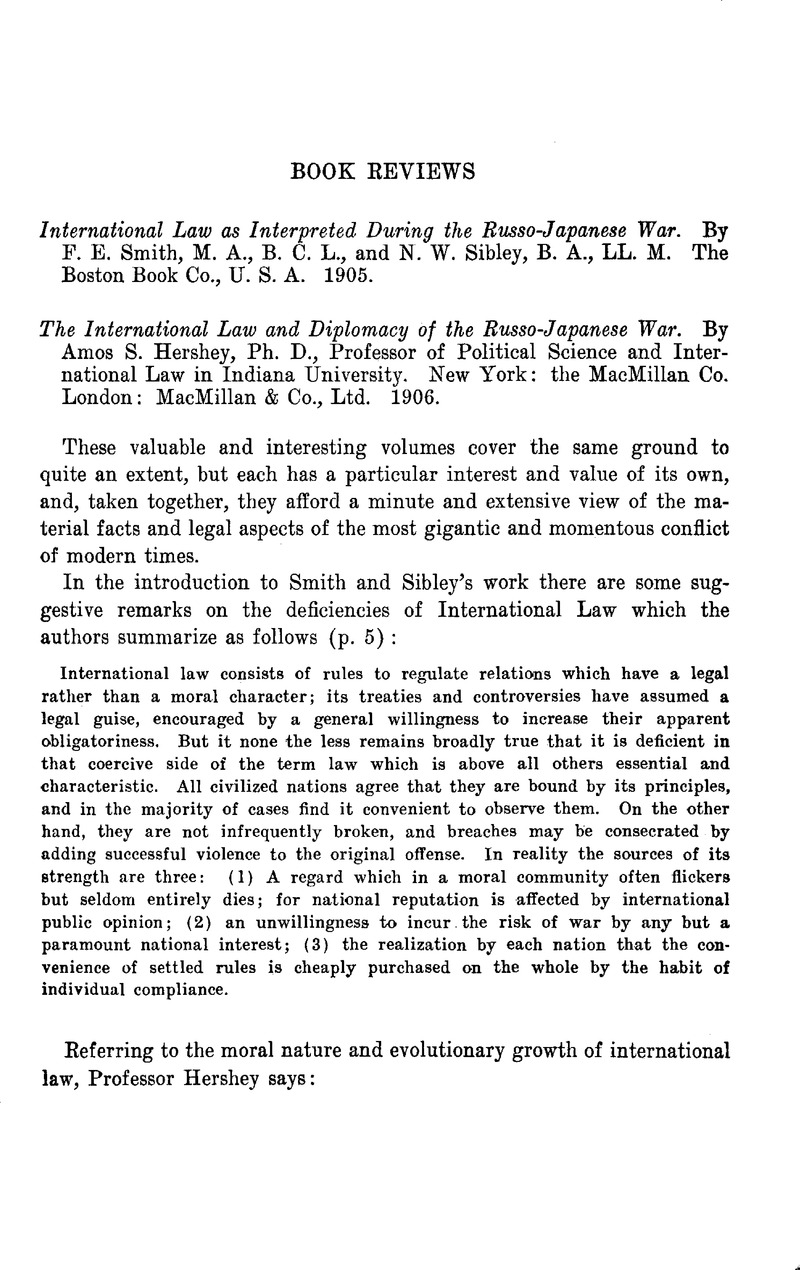No CrossRef data available.
Article contents
International Law as Interpreted During the Russo-Japanese War. By F. E. Smith, M. A., B. C. L., and N. W. Sibley, B. A., LL. M. The Boston Book Co., U. S. A. 1905. - The International Law and Diplomacy of the Russo-Japanese War. By Amos S. Hershey, Ph. D., Professor of Political Science and International Law in Indiana University. New York: the MacMillan Co. London: MacMillan & Co., Ltd. 1906.
Published online by Cambridge University Press: 04 May 2017
Abstract

- Type
- Book Reviews
- Information
- Copyright
- Copyright © American Society of International Law 1907
References
1 On page 14, the authors say: “ It is difficult not to regard her action in 1895 as not merely the overbearing, but even the exclusive, cause of the great war of 1904.” On page 81: “As Vattel considered a person to be shot a spy, it is impossible to cite him as disapproving of the manner of Major Andre's execution.” On the same page: “ As the disguise is admitted even by General Halleck to have been accidental, it is impossible to consider that Andre was a spy who is liable to a felon's death.” On page 437: “ This result is unsatisfactory and is contradictory to the practice of Lord Stowell. No decision of that great admiralty lawyer ever decided that a vessel which like the Allanton had genuine papers disclosing a neutral destination, and which was exactly in its proper course, could be confiscated. But it is astonishing to observe from the argument of M. Sheftel, of the Russian bar, that this conclusion can be supported by the principles of modern continental maritime law, and, in great part, from the Russian naval regulations.” The decree of confiscation was reversed by the Russian Admiralty Council.
2 Cases on International Law during the Chino-Japanese war by Saknye Takahashi, Professor of Law in the Imperial Naval Staff of Japan, Legal Adviser to the Admiral Commanding the Japanese Squadron during the Chino-Japanese war, etc., etc., with a preface by Professor T. E. Holland, D. C. L., and an introduction by Professor Westlake, Q. C., LL. D. Cambridge: At the University Press, 1899; London: C. J. Clay & Sons, Ave Maria Lane, and Stevens & Sons, Chancery Lane.
La Guerre Sino-Japonaise au point de vue du droit international. Par Nagao Ariga (le Professeur). Preface par Paul Fauchille. Paris: Pedone, 1896.
Although the Imperial Government is at present at war with Russia with the purpose of later securing a permanent peace, the students and pupils should make it their special aim to show themselves in no wise hostile toward Russian subjects. Such hostility on their part would give foreign nations a bad opinion of us. Besides, this is an important point to be considered in the education of boys and girls.
3 It is only fair to say that Professor Takahashi, an eye-witness, gives a different version on pages 4–8 of his “ International Law during the Chino-Japanese War.” The excesses were committed by the Japanese in the fury of battle and at sight of the bodies of their comrades who had fallen in the assault and been tortured and mutilated by the enemy.
4 “ Some Guesses at Japan,” by Wm. T. Ellis in The North American Review for October, 1907, pp. 240, 241.
5 The following is an extract from a statement of the controversy published in the Cyclopedic Eeview (Columbian Annual) for 1895, pages 786, 787:
“ The possibilities of a war between Great Britain and the United States over the Venezuelan question were seriously discussed by the press of both countries in December [1895], but the temporary ebullition of war sentiment quickly subsided, save in those few hearts in which it is perennially cherished, and served only to demonstrate more strongly by contrast the real feelings of sympathy and solidarity still prevailing between the great nations of the English-speaking world.”




